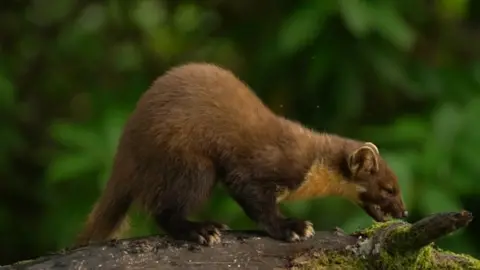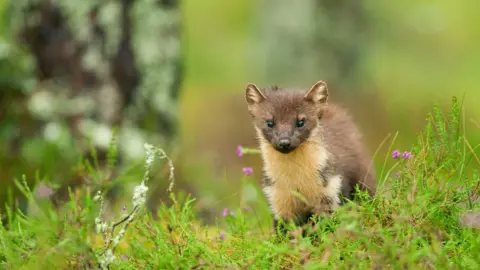Pine martens returned to Forest of Dean after facing extinction
 BBC
BBCOne of Britain's rarest mammals has been re-established in the wild in England and given protected status.
A population of 18 pine martens has been successfully released in the Forest of Dean.
The animal had faced extinction in this country because of extensive hunting and loss of English woodland.
Forestry England, the Gloucestershire Wildlife Trust, Vincent Wildlife Trust and Forest Research worked together to support the pine martens in the forest.
The 18 pine martens have been moved from Scotland, fitted with tracking collars and released in the Forest of Dean.
Forestry England will work with volunteers, local communities and partner organisations to monitor how they are moving through the forest.
Dr Catherine McNicol, Gloucestershire Wildlife Trust's Conservation project Manager, will be leading the monitoring of the pine martens.
She said she hoped the project would give them the "boost they need to become resilient and thrive".

Pine martens
 Terry Whittaker
Terry Whittaker- From the same family as otters and weasels, pine martens were once common among British wildlife
- Similar in size to a domestic cat, with slim bodies, brown fur and a distinctive cream "bib" on their throats, they have long, bushy tails and prominent rounded ears
- They were pushed to the more remote parts of the UK, becoming Britain's second-rarest native carnivore
- At one stage their only remaining stronghold was in the north-west Highlands of Scotland
- Vincent Wildlife Trust moved 51 pine martens from Scotland to Wales between 2015 and 2017 and they now have an established population there
- Source: Gloucestershire Wildlife Trust and Forestry England

Rebecca Wilson, Forestry England's planning and environment manager in the west of England, said pine martens played an integral role in the "delicate balance" of the woodland ecosystem.
The mammal forages on fruit, fungi and a range of prey including the grey squirrel, a non-native species which has had a "detrimental impact on broadleaf woodland" throughout England.
You may also be interested in:
Dr Gareth Parry, director of conservation at Gloucestershire Wildlife Trust, said bringing back the pine marten "plays a vital role in ecosystem functioning" and was an important part of work to tackle a "biodiversity emergency".
The organisations said it was hoped over the next two years more pine martens would be released into the forest and a population would establish there.
In 2018, the government's 25-year Environment Plan stated the reintroduction of native species such as otters and polecats was "key" to nature's recovery.
